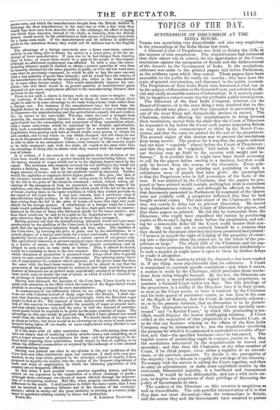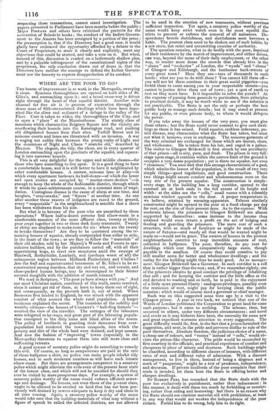TOPICS OF THE DAY.
SUPPRESSION OF DISCUSSION AT THE INDIA HOUSE.
THERE was something very discreditable and also very suspicious in the proceedings at the India House last week. _ A General Court of Proprietors was held on Friday the 17th, at he request of nine proprietors. The requisitionists had intimated that their object was to submit, for the approbation of the Court, resolutions against the occupation of Scinde and the dethronement of the Ameers by the Government of India. In the resolutions, reference was made to the printed papers laid before Parliament, as the evidence upon which they rested. Those papers have been accessible to the public for nearly six months ; they have been the topic of general conversation, and discussed in the public journals. The Proprietors of East India Stock were forewarned what was to be the subject of discussion at the General Court, and referred to offi- cial and easily accessible sources of information. It is scarcely possi- ble to imagine a subject more ripe for profitable public investigation. The Directors of the East India Company, however, (or the
Board of Control—it is the same thing,) were resolved that no dis- cussion should take place ; and they succeeded in preventing it by one of the most flimsy and disreputable devices on record. The Chairman, without allowing the requisitionists to bring forward their resolutions, moved from the chair that the Court of Directors be requested to lay before the Court such papers respecting Scinde as may have been communicated to them by the Secret Com- mittee, and that the same be printed for the use of the proprietors. The avowed object of this motion was to prevent the resolutions from being moved. The pretext for it was that the papers referred had not been "regularly" placed before the Court of Proprietors ; and that they must be " regularly " laid before it, "in order that our decision may go forth to the country with weight and in- fluence." It is possible that it might have been found necessary to call for the papers before coming to a decision, but that could only be known from the course of the discussion. Every pub- licity that can be given by printing and publishing to such a voluminous mass of papers had been given : the presumption is that the Proprietors were in full possession of the facts of the case. It was admitted by the Chairman that the papers he pro- posed to have printed would contain nothingbut what is contained in the Parliamentary volume; • and although he affected to believe that documents presented to Parliament by command of the Queen were not publicly sold, a proprietor informed him that he bad bought several copies. The real object of the Chairman's motion was, not merely to delay but to prevent discussion. He moved that application be made to the Court of Directors for papers, and that those papers be printed. He did this by instruction from the Directors who might have expedited the matter by purchasing copies at faxsaiin's, laying them before the proprietors, and ask- ing for a reasonable delay till the Court could master their con-
tents. He took care not to commit himself by a promise that they should be discussed after they had been presented and printed: "I reserve to myself the right of judging of the propriety of enter- ing into a discussion when the papers are in the hands of the pro- prietors at large." The whole drift of the Chairman and his sup- porters was to postpone the debate on the resolutions indefinitely— in such a manner as might leave it open to them by further delays to evade it altogether. The form of the motion by which the discussion has been evaded
is, if any thing, more objectionable than its substance. A Court is summoned to entertain specific resolutions ; and when it meets, a motion is made by the Chairman, which precludes those resolu- tions from being brought forward. By the law, the Directors are bound, upon a special requisition signed by nine proprietors, to summon a General Court within ten days. But this privilege of the proprietors is a nullity if the Directors have it in their power, as soon as the Court meets, to have it resolved by the Chairman and his body-guard of permanent voters, as was done in the case of the Rajah of Sattara, that the Court do immediately adjourn ; or, as in the present instance, that no discussion is to be permit- ted. The distinction between "a General Court specially sum- moned" and "a Special Court," by which this proceeding is jus- tified, would disgrace the lowest pettifogging attorney. A Court called at the requisition of nine proprietors is a General Court, in so far that any business relating to the affairs of the East India Company may be transacted in it ; but the requisition specifying the purpose for which it is summoned is equivalent to a notice ofmo- tion' and that—the specified business—must be transacted. The regular course of proceeding ought in common justice to be, that the resolutions announced by the requisitionists be moved and seconded ; and that then the Chairman, or any other member of Court, if he think proper, move either a negative or an amend- ment, or the previous question. To decide is the prerogative of the majority ; but to discuss is equally the privilege of the minority. To comply with the statute in calling the Court together, and then to carry an adjournment, or make some equivalent motion by the ever-ready Directorial majority, is a barefaced and transparent evasion. It would be less disreputable, and not a whit more un-
just, to deprive the proprietors of their privilege of discussing the policy of Government at once.
The conduct of the Directors on this occasion is suspicious as well as discreditable. The only possible interpretation of it is that they dare not meet discussion—that the transactions in Scinde, and the course they and the Government have resolved to pursue respecting those transactions, cannot stand investigation. The papers presented to Parliament have been months before the public ; Major POSTANS and others have criticized the pretexts for the annexation of Scinde in books ; the conduct of the Indian Govern- ment to the Ameers has been arraigned by a portion of the press : the presumption is, that if the Directory had a good case, it would gladly have embraced the opportunity afforded by a debate in the Court of Proprietors, to state it clearly and explicitly, meet any objections that could be started, and take a vote on it. But when, instead of this, discussion is evaded on a ludicrously shallow plea, and by a palpable infringement of the constitutional rights of the proprietors, the only conclusion drawn out of doors is, that the Directors have neither the courage to defend the Indian Govern- ment nor the honesty to express disapprobation of its conduct.



























 Previous page
Previous page